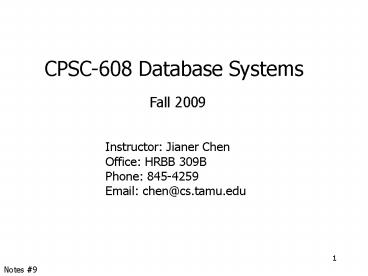CS 245 Database System Principles - PowerPoint PPT Presentation
1 / 27
Title:
CS 245 Database System Principles
Description:
Example b=4 bits, i =2, 2 keys/bucket. 00 01 10 11. 0101. 0000. m = 01 (max used block) ... Example: BAD CASE. Very full. Very empty Need to move. m here... – PowerPoint PPT presentation
Number of Views:20
Avg rating:3.0/5.0
Title: CS 245 Database System Principles
1
CPSC-608 Database Systems
Fall 2009
Instructor Jianer Chen Office HRBB 309B Phone
845-4259 Email chen_at_cs.tamu.edu
Notes 9
2
Linear hashing
- Another dynamic hashing scheme
3
Example b4 bits, i 2, 2 keys/bucket
Future growth buckets
0101
0000
1111
1010
- 00 01 10 11
m 01 (max used block)
4
Example b4 bits, i 2, 2 keys/bucket
Future growth buckets
0101
0000
1111
1010
- 00 01 10 11
m 01 (max used block)
4
5
Example b4 bits, i 2, 2 keys/bucket
Future growth buckets
0101
0000
- 00 01 10 11
m 01 (max used block)
6
Example b4 bits, i 2, 2 keys/bucket
Future growth buckets
0101
0000
1111
1010
- 00 01 10 11
m 01 (max used block)
6
7
Example b4 bits, i 2, 2 keys/bucket
- insert 0101
0101
- can have overflow chains!
Future growth buckets
0101
0000
1111
1010
- 00 01 10 11
m 01 (max used block)
8
Note
- In textbook, n is used instead of m
- nm1
n10
Future growth buckets
0101
0000
1111
1010
00 01 10 11
m 01 (max used block)
9
Example b4 bits, i 2, 2 keys/bucket
Future growth buckets
0101
0000
1111
1010
- 00 01 10 11
m 01 (max used block)
10
10
Example b4 bits, i 2, 2 keys/bucket
Future growth buckets
0101
0000
1010
1111
1010
- 00 01 10 11
m 01 (max used block)
10
11
Example b4 bits, i 2, 2 keys/bucket
Future growth buckets
0101
0000
1010
1111
1010
- 00 01 10 11
m 01 (max used block)
10
12
Example b4 bits, i 2, 2 keys/bucket
Future growth buckets
0101
0000
1010
1111
1010
- 00 01 10 11
m 01 (max used block)
10
11
13
Example b4 bits, i 2, 2 keys/bucket
Future growth buckets
0101
0000
1010
1111
0101
1111
1010
- 00 01 10 11
m 01 (max used block)
10
11
14
Example Continued How to grow beyond this?
i 2
1111
1010
0101
0000
0101
- 00 01 10 11
. . .
m 11 (max used block)
15
Example Continued How to grow beyond this?
i 2
1111
1010
0101
0000
0101
- 00 01 10 11
0
0
0
0
100 101 110 111
m 11 (max used block)
16
Example Continued How to grow beyond this?
i 2
1111
1010
0101
0000
0101
100
- 00 01 10 11
0
0
0
0
. . .
100 101 110 111
m 11 (max used block)
100
17
Example Continued How to grow beyond this?
i 2
3
1111
1010
0101
0000
0101
100
- 00 01 10 11
0
0
0
0
. . .
100 101 110 111
m 11 (max used block)
100
17
18
Example Continued How to grow beyond this?
i 2
3
0101
1111
1010
0101
0000
0101
0101
101
100
- 00 01 10 11
0
0
0
0
. . .
100 101 110 111
m 11 (max used block)
100
101
19
? When do we expand file?
- Keep track of used slots
- total of slots
U
- If U gt threshold then increase m
- (and maybe i )
20
Linear Hashing
Summary
- Can handle growing files
- - with less wasted space
- - with no full reorganizations
- No indirection like extensible hashing
21
Example BAD CASE
- Very full
- Very empty Need to move
- m here
- Would waste
- space
22
Summary
- Hashing
- - How it works
- - Dynamic hashing
- - Extensible
- - Linear
23
Next
- Indexing vs. hashing
- Index definition in SQL
- Multiple key access
24
Indexing vs. Hashing
- Hashing good for probes given key
- e.g., SELECT
- FROM R
- WHERE R.A 5
25
Indexing vs. Hashing
- INDEXING (including B-trees) good for
- range searches
- e.g., SELECT
- FROM R
- WHERE R.A gt 5
26
Index definition in SQL
- Create index name on rel (attr)
- Drop INDEX name
27
- CANNOT SPECIFY TYPE OF INDEX
- (e.g. B-tree, hashing, )
- OR PARAMETERS
- (e.g. load factor, size of hash, )
- at least not in SQL
Note































